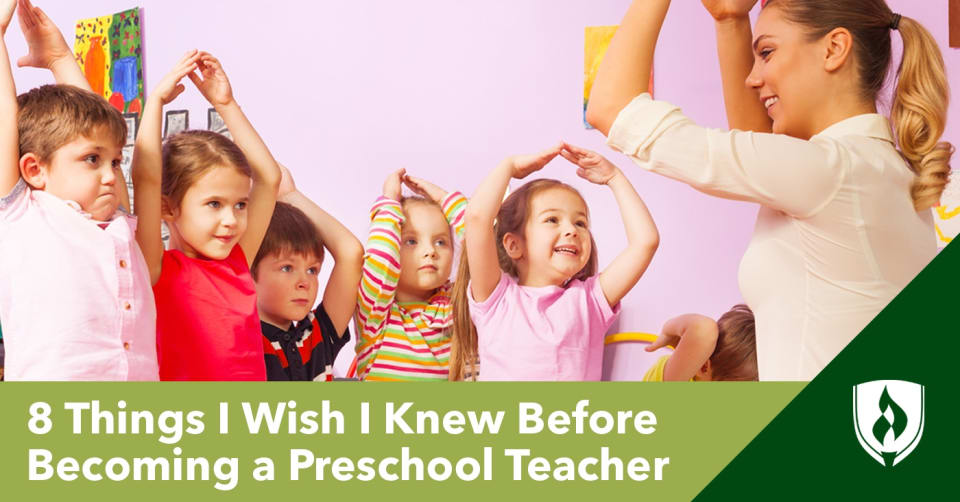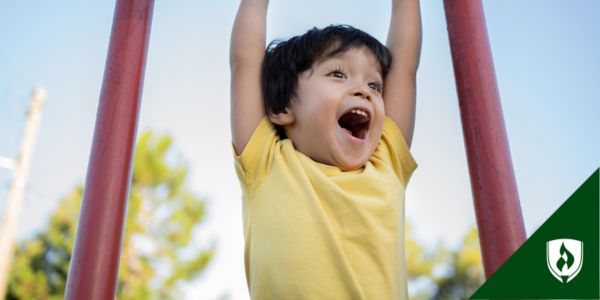
Imagine it. Your own preschool classroom filled with student artwork, bright colors, and lots of little ones laughing and carrying on as they learn. The preschool age is such an incredible time of exploration for children, and you want to be part of guiding that crucial learning experience.
You may have done some research on how to become a preschool teacher. But do you have a realistic picture of what the role is like? While it’s easy to have an idealized vision of what life is like as a preschool teacher, there’s obviously more to the role than what you might initially imagine.
“The best learning in preschools happens in a learning-through-play environment, and it can be easy to think that early childhood teachers simply play with students all day long,” says David Egolf, head of school at Corlears School. He emphasizes that early childhood learning really happens through the careful engagement preschool teachers create in their classrooms.
If you are curious about the details of working as a preschool teacher, read on! We’ve asked preschool teachers and early childhood education experts to share the things they wish they knew before first stepping foot in the classroom. Also check out tips on crafting a childcare resume.
Before becoming a preschool teacher, I wish I knew…
1. Certain social skills are new to preschoolers
When you think of creating a preschool curriculum, you might not consider all the norms of school that might be brand new to preschoolers. “I entered a preschool setting straight out of college and was unaware of all of the learning opportunities that my students would encounter in a day,” says Jessica Garza, early childhood educator and founder of The Primary Parade.
“For example, things such as how to sit up straight, how to walk in a line, how to share classroom manipulatives and how to listen when others speak are a few topics that need to be explicitly taught when working with young children.”
While it’s easy to think of things like identifying colors and shapes as “the basics,” really much of the preschool experience is about setting a foundation for how to behave in a social setting—and that’s a hugely important piece of the puzzle for future success.
2. All the work that happens outside the classroom
Most people get into early childhood education because they love being with children. But preschool teachers have lots of duties outside of the classroom. “The thing that surprised me the most about being a preschool teacher was how much time I spent doing things other than teaching my students,” says Sarah Miller, teacher and founder of Homeschooling 4 Him.
Some of the most time-consuming tasks are lesson planning, recordkeeping, communicating with parents and planning for upcoming events like open houses, according to Miller. “Over time, I learned to be more efficient at these other aspects of the job, but it took time to find a rhythm and routine.”
3. To advocate for developmentally appropriate practices
Preschool teachers often need to discuss age-appropriate elements with the families of their students. They may even need to do so with colleagues or school administrators—something Kate Fraiser, parent coach and early childhood consultant, describes as a shock. “I found I had to be an advocate for what were actually best practices for young children.”
Figuring out how to bridge these gaps in understanding became an important part of the job for Fraiser. She says her first response was abrasive and ultimately not that helpful for getting student needs met. Instead, she sought research supporting best practices around social and emotional learning and literacy skills. Then she held parent classes, invited her colleagues and shared the information.
“I would encourage anyone considering this field to understand young children's unique needs during this specialized time in life and learn best how to explain this to families and colleagues.”
4. To be prepared for anything
Working with kids often means fun, excitement, and laughing at the adorable things they say and do. But it also means skinned knees, sick tummies, and working with parents and families.
“Be prepared to be physically and mentally engaged in your work, to get on the floor with your students, laugh and play with them, while also problem-solving and supporting their social emotional growth,” Egolf says. “Also, know that an important aspect of your job will be working with families to help them understand their child's developmental and learning needs.”
5. Backup plans and activities are a lifesaver
When you’re just getting your footing as a preschool teacher, it can be easy to plan just a few activities that will check the box for meeting learning objectives—but you’ll quickly learn about the need for ways to supplement those core plans. Preschool teachers need an abundance of games and activities to keep students occupied. Little ones aren’t known for their long attention spans, so this can be difficult for newer teachers who aren’t quite acclimated.
“Always be prepared,” Garza says. “Children learn best through play, so be prepared to have plenty of hands-on and student-centered areas for your students to be engaged in throughout the day.” Even if it’s a few activities you have saved up in your back pocket, knowing how to improvise when your plans fall short is essential for preschool teachers.
6. To remember each child is an individual
Although you’ll be teaching to a classroom full of kids, don’t forget that you need to focus on each one as an individual as well. Preschoolers follow their own development patterns. Three- to five-year-olds change every day. Preschool teachers have the responsibility of fostering this growth and helping children learn foundational social and emotional skills.
In addition, you might be teaching exceptional children. Get to know your students and their needs so that you can accommodate their learning styles. Adjust activities as needed so that everyone can participate.
7. To emphasize preschool as early childhood education
While this may seem obvious to you, oftentimes people may think preschools are just a place to have watch over their kids without giving much thought to their educational value. Preschools exist to build learning foundations that will prepare kids for kindergarten.
“One common misconception people have about teaching preschool is that preschool teachers are just glorified babysitters,” Garza says. She adds that this misconception makes it hard for people to understand just how complex teaching preschool truly is. “It's important to take in account a child's social, emotional, physical, communicative and cognitive capabilities when you teach young children,” Garza says.
Preschool teachers need to understand tons of information about how children learn and develop—then distill all of that into engaging activities to help their students progress.
8. Making a difference never gets old
Being a preschool teacher can sometimes seem thankless at times, but the rewards are worth it. Whether it’s rambunctious greetings in the mornings or the proud look on a child’s face after they mastered that new skill, every preschool teacher has a favorite part of the job.
“Being an early childhood educator is hard work but very rewarding,” Egolf says. All the support and encouragement you give young students as they develop and overcome frustrations adds up to very real results. “Early childhood educators have a tremendous impact on the success of students when they enter elementary programs.”
Is becoming a preschool teacher right for you?
You’ve just read some of the lesser-known parts of being a preschool teacher—both the good and bad. Now it’s time to make a decision. Is becoming a preschool teacher in your future? If so, earning an Early Childhood Education (ECE) degree can help position you for non-licensure preschool teaching roles. Our article “What Can You Do with an Early Childhood Education Degree?” can help highlight the value of formal education in the ECE field. Additionally, check out what to look for in a preschool.
Stay up to date with the latest preschool teacher blogs.
EDITOR’S NOTE: This article was originally published in September 2014. It has since been updated to include information relevant to 2021.
The Early Childhood Education programs at Rasmussen University are not designed to meet, and do not meet, the educational requirements for licensure to teach in public preschools, or kindergarten, elementary, or secondary schools in any state. A bachelor’s degree from a state-approved college or university and a state teaching license are typically required to work as a teacher in a public school, and in private school settings. The Rasmussen University Early Childhood Education programs are not approved by any state agency that licenses teachers. States, municipalities, districts, or individual schools may have more stringent licensure requirements and other standards. Childcare facilities and the states in which they are located establish qualifications for staff that work with children, and often implement guidelines regarding age, education, experience, background, and professional development. Before enrolling, it is important to understand all of the licensure eligibility standards for a desired career by consulting the appropriate state and school/facility requirements.
Related Articles:
- 26 Satisfying Summer Jobs for Teachers
- I Love Teaching: Preschool Pros Share What They Love About the Job
- Providers Share 6 Things You Should Know Before Starting a Home Daycare
- 4 Types of Learning Styles: How to Accommodate a Diverse Group of Students
- Running a Home Daycare: The Business Advice You Need to Succeed
- Experts Share 6 Things You Should Know Before Working with Kids




